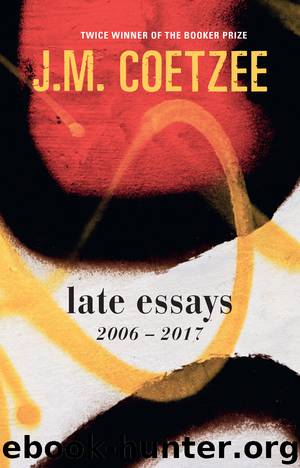Late Essays by J.M. Coetzee

Author:J.M. Coetzee
Language: eng
Format: epub
Publisher: Penguin Random House Australia
Published: 2017-12-18T05:00:00+00:00
On 24 March 1976, the military seized power in Argentina, with the collusion of the civilian government and to the relief of a large segment of the population, sick and tired of political violence and social chaos. The generals at once put into effect their master plan or ‘Process for National Reorganization’. General Ibérico Saint-Jean, installed as governor of Buenos Aires, spelled out what El Proceso would entail: ‘First we will kill all the subversives, then we will kill their collaborators, then their sympathizers, then those who remained indifferent, and finally we will kill the timid.’3
Among the many so-called subversives detained on the first day of the coup was Di Benedetto. Later he would (like Josef K.) claim not to know why he was arrested, but it is plain that it was in retaliation for his activities as editor of Los Andes, where he had authorized the publication of reports on the activities of right-wing death squads. (After his arrest, the proprietors of the newspaper wasted no time in washing their hands of him.)
Detention routinely began with a bout of ‘tactical interrogation’, the euphemism for torture, intended to extract information but also to make it plain to the detainee that he or she had entered a new world with new rules. In many cases, writes Eduardo Duhalde, the trauma of the first torture, reinforced by having to watch or listen to the torture of other prisoners, marked the prisoner for the rest of his/her life. The favoured instrument of torture was the electric prod, which induced acute convulsions. After-effects of the prod ranged from intense muscular pain and paralysis to neurological damage manifested in dysrhythmia, chronic headaches, and memory loss.4
Di Benedetto spent eighteen months in prison, mostly in the notorious Unit 9 of the Penitentiary Services of La Plata. His release came after appeals to the regime by Heinrich Böll, Ernesto Sabato, and Jorge Luis Borges, backed by PEN International. Soon afterwards he went into exile.
A friend who saw him after his release was distressed by how he had aged: his hair had turned white, his hands trembled, his voice faltered, he walked with a shuffle. Although Di Benedetto never wrote directly about his prison experience – he preferred to practise what he called the therapy of forgetting – press interviews allude to vicious blows to the head (‘Since that day my capacity to think has been affected’); to a session with the cattle prod (the shock was so intense that it felt as if his inner organs were collapsing); and to a mock execution before a firing squad when the one thought in his mind was: What if they shoot me in the face?5
Fellow inmates, most of them younger than he, recalled that he seemed bewildered by the brutal prison regime, trying to make sense of the random assaults he suffered from guards when the essence of these assaults was that they should be unpredictable and – like a Kafkan nightmare – make no sense.
Exile took Di Benedetto to
Download
This site does not store any files on its server. We only index and link to content provided by other sites. Please contact the content providers to delete copyright contents if any and email us, we'll remove relevant links or contents immediately.
The Rules Do Not Apply by Ariel Levy(4946)
Bluets by Maggie Nelson(4541)
Too Much and Not the Mood by Durga Chew-Bose(4324)
Pre-Suasion: A Revolutionary Way to Influence and Persuade by Robert Cialdini(4204)
The Motorcycle Diaries by Ernesto Che Guevara(4078)
Walking by Henry David Thoreau(3946)
Schaum's Quick Guide to Writing Great Short Stories by Margaret Lucke(3368)
What If This Were Enough? by Heather Havrilesky(3300)
The Daily Stoic by Holiday Ryan & Hanselman Stephen(3292)
The Day I Stopped Drinking Milk by Sudha Murty(3184)
The Social Psychology of Inequality by Unknown(3011)
Why I Write by George Orwell(2941)
Letters From a Stoic by Seneca(2783)
A Short History of Nearly Everything by Bryson Bill(2679)
A Burst of Light by Audre Lorde(2586)
Insomniac City by Bill Hayes(2535)
Feel Free by Zadie Smith(2472)
Upstream by Mary Oliver(2382)
Miami by Joan Didion(2362)
